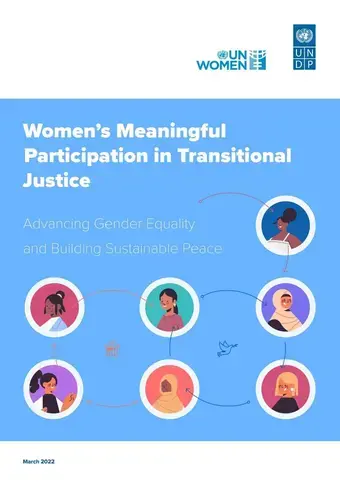Rule of law and transitional justice
Gender-responsive rule of law and transitional justice are obligations under international human rights law and UN Security Council resolutions. Both are fundamental to addressing past harms from conflict and creating futures of sustainable development and durable peace.
Rule of law refers to a system in which all individuals and institutions, including the State, are accountable to laws that are publicly known, enforced without bias, and aligned with international human rights standards. The rule of law underpins peace, justice, protection of rights, and effective remedies for violations.
Transitional justice comprises processes by which a society comes to terms with a legacy of human rights abuses and conflict. It provides redress for victims, rebuilds trust, strengthens civic participation, and lays foundations for reconciliation and sustainable peace.
Gender-responsive rule of law and transitional justice acknowledge that conflict exacerbates gender inequality and discrimination. For instance:
- Women and girls face exclusion from decision-making spaces.
- Impunity for sexual and other gender-based violence remains widespread.
- Gender discrimination in the economy makes it even harder for women to recover from displacement.
- Discriminatory laws and social norms prevent survivors from obtaining justice, and institutions fail to respond to their needs.
These barriers silence victims and undermine the legitimacy and effectiveness of transitional justice and the rule of law. By contrast, gender-responsive approaches uphold women’s rights and recognize their leadership in peacebuilding, human rights, and justice. Such approaches are more likely to address structural inequalities, prevent recurring violence and advance commitments to gender equality.
Gender-responsive rule of law and transitional justice strategies broadly involve actions to respond to gender-based violations and redress sources of inequality and discrimination. They may include:
- Establishing national legislation in line with international standards on women’s rights.
- Increasing prosecutions and closing the impunity gap for gender-based crimes, including conflict-related sexual violence and reproductive violence.
- Upholding women’s right to participate and lead in all dimensions of rule of law institutions and reforms as well as transitional justice processes.
- Taking a comprehensive approach to transitional justice, encompassing judicial and non-judicial measures such as institutional reforms, prosecutions, truth telling, reparations programmes, traditional justice and the vetting of public officials, all of which should apply a gender lens.
- Ensuring that rule of law institutions and transitional justice processes have the necessary gender expertise to comprehensively address gender-based violence and rights violations.
- Closing information gaps and removing other barriers that limit access to formal and informal justice mechanisms, and consulting with women on avenues they prefer.
- Developing legal empowerment initiatives so that women gain access to legal systems and knowledge to navigate them.

![Women walk arm in arm in IDP [internally displaced persons] Site A, in Bentiu, South Sudan in 2023. Some of the women here have survived sexual violence. In this site, UNFPA, with the support of the CERF Fund, has set up a safe space for them, without men, so that they can recover and set up income-generating activities. Photo: OCHA/Alioune Ndiaye.](/sites/default/files/styles/card_teaser/public/2025-10/crsv_whodoeswhat_southsudan_ocha-ssd_gbv_bentiu-88_1200x800.jpg.webp?itok=XPBduXs3)












